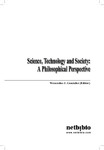Mostrar o rexistro simple do ítem
Science, technology and society: a philosophical perspective
| dc.contributor.author | González, Wenceslao J. | |
| dc.date.accessioned | 2014-03-28T19:01:48Z | |
| dc.date.available | 2014-03-28T19:01:48Z | |
| dc.date.issued | 2005 | |
| dc.identifier.isbn | 0-9729892-2-6 | |
| dc.identifier.isbn | 978-0-9729892-2-0 | |
| dc.identifier.uri | http://hdl.handle.net/2183/11862 | |
| dc.description.abstract | [Abstract] The emphasis on the realm of Science, Technology and Society or Science and Technology Studies may have the same degree of relevance that the “historical turn” had in the past. It is a “social turn” which affects philosophy of science as well as philosophy of technology. It includes a new vision of the aims, processes and results of scientific activities and technological doings, because the focus of attention is on several aspects of science and technology which used to be considered as secondary, or even irrelevant. This turn highlights science and technology as social undertakings rather than intellectual contents. According to this new vision, there are several important changes as to what should be studied the objects of research, how it should be studied the method and what the consequences for those studies are. The new focus of attention can be seen in many changes, and among them are several of special interest: a) from what science and technology are in themselves (mainly, epistemic contents) to how science and technology are made (largely, social constructions); b) from the language and structure of basic science to the characteristics of applied science and the applications of science; c) from technology as a feature through which human beings control their natural surroundings (a step beyond “technics” due to the contribution of science) to technology as a social practice and an instrument of power; and d) from the role of internal values necessary for “mature science” and “innovative technology” to the role of contextual or external values (cultural, political, economic …) of science and technology. Wenceslao J. Gonzalez is professor of logic and philosophy of science at the University of A Coruña (Spain). He has been vicedean of the School of Humanities and president of the Committee of Doctoral Programs at the University. He has been a visting researcher at the Universities of St. Andrews, Münster and London (London School of Economics), as well as Visiting fellow at the Center for Philosophy of Science, University of Pittsburgh. He has given lectures at the Universities of Pittsburgh, Stanford, Quebec and Helsinki. The conferences in which he has participated include those organized by the Universities of Uppsala, New South Wales, Bologne and Canterbury (New Zealand). He has edited 20 volumes and published 70 papers. He is the editor of the monographic issues on Philosophy and Methodology of Economics (1998) and Lakatos’s Philosophy Today (2001). His writings include “Economic Prediction and Human Activity. An Analysis of Prediction in Economics from Action Theory” (1994), “On the Theoretical Basis of Prediction in Economics” (1996), “Rationality in Economics and Scientific Predictions: A Critical Reconstruction of Bounded Rationality and its Role in Economic Predictions” (1997), “Lakatos’s Approach on Prediction and Novel Facts” (2001), “Rationality in Experimental Economics: An Analysis of R. Selten’s Approach” (2003), “From ErklärenVerstehen to PredictionUnderstanding: The Methodological Framework in Economics” (2003), and “The Many Faces of Popper’s Methodological Approach to Prediction” (2004). | es_ES |
| dc.language.iso | eng | es_ES |
| dc.publisher | Netbiblo | es_ES |
| dc.subject | Tecnología | es_ES |
| dc.subject | Filosofía | es_ES |
| dc.subject | Ciencias | es_ES |
| dc.title | Science, technology and society: a philosophical perspective | es_ES |
| dc.type | info:eu-repo/semantics/book | es_ES |
| dc.type | info:eu-repo/semantics/publishedVersion | es_ES |
| dc.rights.access | info:eu-repo/semantics/openAccess | es_ES |






